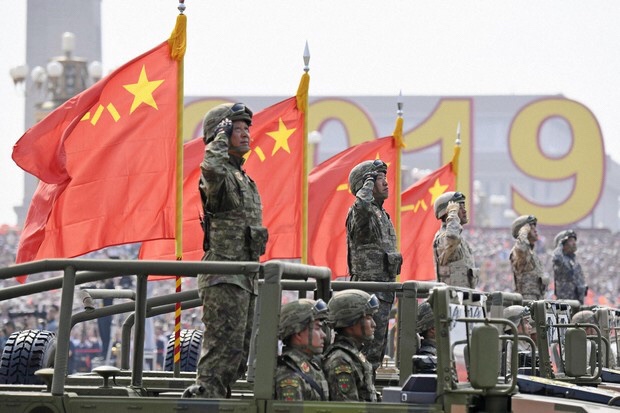April 16, 2020 (Mainichi Japan)
China holds a military parade in Beijing on Oct. 1, 2019, marking the 70th anniversary of the founding of the communist People’s Republic of China. (Kyodo)
WASHINGTON (Kyodo) — The U.S. State Department on Wednesday suggested that China may have conducted low-level nuclear tests despite Beijing’s assertion it has adhered to an international accord banning all nuclear explosions.
“China maintained a high level of activity at its Lop Nur nuclear weapons test site throughout 2019,” the department said in a report on arms control, pointing to “concerns” about Beijing’s adherence to the “zero yield” standard for nuclear blasts.
China is among countries to have not ratified the Comprehensive Nuclear Test Ban Treaty, which prohibits countries from carrying out all types of nuclear explosive tests. But Beijing, along with the United States and other nuclear powers, has committed to pursuing a moratorium on nuclear test explosions.
The report said concerns center on China’s possible preparation to operate its Lop Nur test site in the far western Xinjiang region, its use of explosive containment chambers and extensive excavation activities at Lop Nur.
It also criticized the lack of transparency about China’s nuclear testing activities, alleging it has been “frequently blocking” data transmission for the international monitoring of nuclear weapon test explosions.
Meanwhile in Beijing, the Chinese Foreign Ministry reiterated the country’s commitment to the nuclear moratorium, saying such U.S. accusations on China’s nuclear activities are completely groundless, fictitious and not even worth refuting.
“China has always conscientiously fulfilled its international obligations and commitments in a responsible manner,” ministry spokesman Zhao Lijian said during a regular press briefing on Thursday, adding that the United States is the one withdrawing from its arms control and nonproliferation commitments.
“The international community should be highly alert to this dangerous U.S. trend and urge the U.S. to change its course,” he said.
The 1996 CTBT has been signed by 184 countries and ratified by 168, but it needs to be signed and ratified by 44 specific nuclear technology holder countries before it can enter into force. Eight of those states — the United States, China, Egypt, India, Iran, Israel, North Korea and Pakistan — have yet to ratify it.
No comments:
Post a Comment